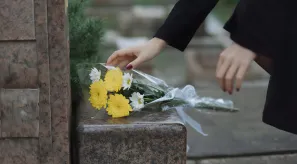A farewell ceremony to honour the memory of a loved one is of great significance when it comes to coping with grief when a family member dies. These ceremonies serve as a way to remember and pay tribute to the deceased person together with other people who loved and appreciated them, making it also a way to give each other mutual support and comfort during these times of grief.
There is no single way to carry out a farewell ceremony for a loved one. There are many possible options, and they largely depend on cultural or religious considerations, or the wishes expressed by the person who has passed away before their death.
In this article, Stelae looks at some of these farewell ceremonies with examples.
Traditional funeral
A traditional funeral is the most widespread type of farewell and mourning ceremony in our society and is associated with the religious beliefs of the deceased person and their family.
For this reason, it is usually presided over by a priest in a church or chapel. It is like a mass, conducted in a solemn manner with readings.
In the past, there would have been an open coffin during the ceremony but now, to respect the intimacy and dignity of the deceased, this is no longer the case.
Memorial service
A memorial service is a type of farewell ceremony for a loved one that takes place some time after the person's death. It is usually done a few months after or on the anniversary of the death of a loved one.
This means that the ceremony is performed without the body present of the deceased person. Apart from this detail, this farewell ceremony has the same characteristics as a traditional funeral, since it tends to be of a religious nature, and is performed by a priest in a church.
Wake
Nowadays, one of the most common farewell ceremonies is a wake. It has an informal ‘open door’ character which allows family and close friends to offer condolences to the family of the deceased.
It can be done as an alternative to a traditional funeral, but it is not exclusive. In other words, a wake can be held in a funeral home or in the deceased's own home and, prior to the burial or cremation, a religious farewell ceremony can also be held.
Depending on the wishes of the family, there are many ways to hold a wake. For example, the body may or may not be present, or catering can be organised if required. It can take place over quite a wide duration so that people can come to express their condolences to relatives.
Accompaniment
For those families who want a more intimate farewell ceremony for a loved one, a ceremony of accompaniment gives them the opportunity to receive sympathy from loved ones in a family setting.
In this type of farewell to the deceased, simplicity prevails and ceremonies are dispensed with. In this way, opting for direct cremation, a fast, transparent and economical service that we offer at Stelae, is an alternative to the traditional funeral that more and more families are favouring.
Personalised ceremony
For families who do not want a religious farewell ceremony for their loved one, a personalised civil ceremony is one of the most popular options.
This type of tribute is becoming more and more widespread because it offers an option to choose a unique farewell in which the deceased is the protagonist.
In this ceremony the family member who has passed away is remembered with messages that are read aloud. The structure of the ceremony is flexible - although it is usually relatively similar in most cases - with shared experiences, anecdotes and memories that allow informal and endearing homage to be paid to our loved one.
The person who officiates the ceremony has no religious link and only guides those present in the development of the ceremony, allowing those who best knew the deceased to speak.
Ecological funeral
Another farewell ceremony that is becoming increasingly widespread is the ecological funeral. Much simpler than traditional options, its aim is to reduce the environmental impact of a funeral as much as possible.
In this type of ceremony, simplicity comes first. Ornamentation is reduced to a minimum and reusable and biodegradable materials are used.
Ecological funerals focus on the idea of a return to nature and, therefore, this kind of farewell ceremony is more intimate, personalised and informal. Although without a defined structure, it has a clear objective: to be as respectful as possible to the environment.
This is the main difference between an ecological funeral and a civil funeral. In both cases there are many ceremony options and this is regardless of the burial method chosen when our loved one dies.



